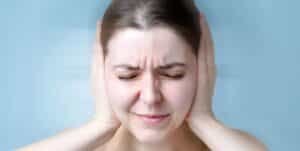What Is Hearing Loss?
Hearing loss is a condition in which a person has trouble hearing. Hearing loss occurs when a person is unable to hear sound partially or fully, in either one or both of their ears. According to the National Institute on Deafness and Other Communication Disorders, 25% of people between the ages of 65 and 74 suffer from this type of hearing loss.
It is important to prevent hearing loss from getting worse because, hearing loss can cause people to feel isolated, frustrated, and sad. It can also affect their social life and their work life.
Understanding The Different Types of Hearing Loss
Hearing loss is frequently blamed on aging or long-term exposure to loud noises. A few types of hearing loss can be treated surgically or with medications. Others are more permanent, requiring only hearing aids or implants to function.
Depending on whether the problem is in the outer, middle, or inner ear, hearing loss can be classified into three categories:
- Conductive hearing loss is caused by a mechanical issue in the ear. Any disease or structural problem in the outer or middle ear that causes hearing loss. In such cases, surgery and medications may be beneficial.
- Sensorineural hearing loss (SNHL) occurs as a result of nerve damage in the inner ear. This is a permanent condition. A cochlear implant or hearing aid could make life easier.
- Mixed hearing loss is a combination of the two types of hearing loss.
Symptoms of Hearing Loss
Before diving into hearing loss prevention, it is critical to first understand the symptoms of hearing loss.
Hearing loss usually develops over time. You will not notice any changes in your hearing at first. However, if you experience any of the following symptoms, you should seek medical attention:
- Speech and other sounds are muffled.
- Difficulty understanding words, especially when there is background noise or you are in a crowd.
- Having difficulty hearing consonants
- frequently requesting that others speak more slowly, clearly, and loudly
- Turning up the volume on the television or radio
- Withdrawal from discussions
- Avoidance of certain social situations
- Hearing loss that disrupts your daily activities
- Hearing loss that is more severe in one ear
- Hearing loss that occurs suddenly
- Ringing in the ear
- Continued ear pain as well as hearing problems
Hearing Impairment Due to Age
Hearing loss due to aging may be a common condition affecting many older adults. Almost one in every two adults over the age of 65 has some form of deafness.
Another term for age-related hearing loss is presbycusis. Age-related hearing loss has no cure. If you are detected with this condition, your doctor may advise you to use hearing aids to improve your hearing.
Hearing loss with age is a progressive condition. This means that it worsens over time. Using assistive devices such as hearing aids can improve your quality of life even if your hearing loss worsens over time.
Although age-related deafness is not a life-threatening condition, if left untreated, it can have an unfavorable impact on your quality of life.
What conditions can damage the ear or lead to hearing loss?
Understanding the causes of hearing loss is necessary before identifying ways to prevent hearing loss. Below listed are some of the common causes of hearing loss:
Aging. The inner ear structures degenerate over time.
A lot of noise. Loud noises can damage the cells in your inner ear. Long-term exposure to loud noises can cause damage, as can a brief blast of noise, such as a gunshot.
Heredity. Your genetic makeup may predispose you to ear damage from noise or deterioration from aging.
Noises from the workplace. Jobs in which loud noise is a regular part of the working environment, such as farming, construction, or factory work, can cause ear damage.
Noises made for recreation. Exposure to explosive noises, such as those produced by firearms and jet engines, can result in immediate and permanent hearing loss.
Hearing loss can also be caused by certain medications and illnesses.
There are some things that people can do to prevent hearing loss from getting worse such as avoiding loud noises like rock concerts, not smoking cigarettes, wearing earplugs when they are in noisy environments like construction sites or nightclubs, and using protection when they’re around loud machinery at work.
How To Prevent Hearing Loss?
As they say, ‘Prevention is better than cure.’ However, it is not possible to stop hearing loss in all cases.
The steps below can help you to understand how to prevent hearing loss from getting worse especially in case of noise-induced hearing loss and deepening of age-related hearing loss:
- Keep your ears safe. The best protection is to limit the duration and intensity of your noise exposure. Use safety equipment such as plastic earplugs or glycerin-filled earmuffs in the workplace.
If you work around loud noises, swim frequently, or go to concerts on a regular basis, you should get regular hearing tests.
- Avoid long periods of exposure to loud noises and music.
Avoid recreational dangers. Snowmobiling, hunting, using power tools, and attending rock concerts can all cause hearing damage over time. Hearing protectors or taking breaks from the noise can help protect your ears. Turning down the music volume is also beneficial.
- Seek medical attention for ear infections. If left untreated, they can cause permanent damage to the ear.
Final word
Untreated hearing loss can have unexpected consequences for your overall health. Hearing loss can not only cause social isolation, leading to complications such as loneliness and depression, but it can also cause physical symptoms such as muscle tension, headaches, chronic tinnitus, or ringing in the ears.
If you or a loved one suspects they have hearing loss, it is critical to see a doctor for a hearing test to assess the problem before it worsens or develops further complications.





